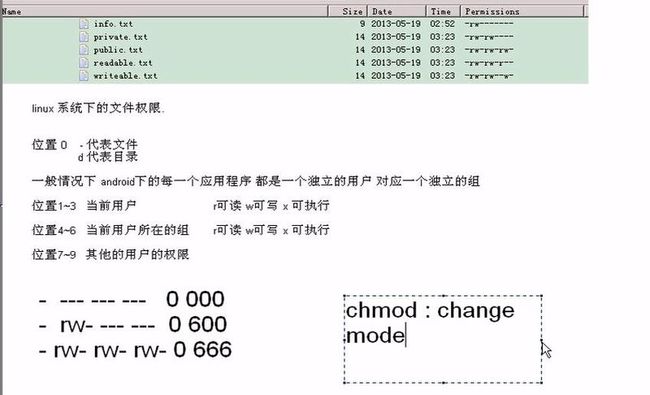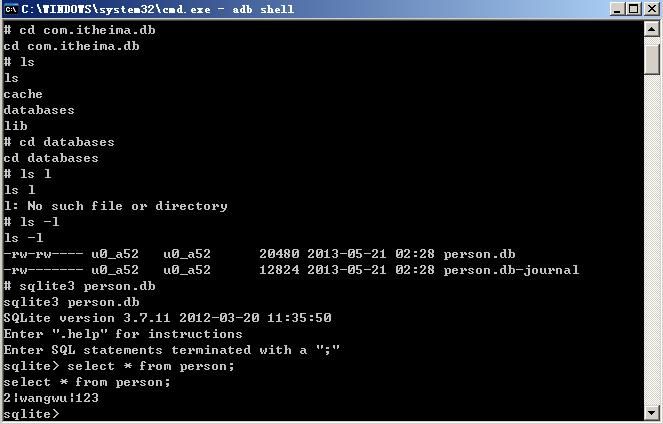1.android下junit测试框架配置 单元测试需要在手机中进行安装测试 (1).在清单文件中manifest节点下配置如下节点 <instrumentation android:name="android.test.InstrumentationTestRunner" android:targetPackage="com.example.demo1" /> 上面targetPackage指定的包要和应用的package相同。 (2)在清单文件中application节点下配置如下节点 <uses-library android:name="android.test.runner"/> (3).编写业务逻辑类 package com.example.demo1.service; public class UserService { public int add(int x, int y) { return x + y; } } (4).编写单元测试类,该类继承 AndroidTestCase package com.example.demo1.test; import com.example.demo1.service.UserService; import android.test.AndroidTestCase; public class TestUserService extends AndroidTestCase { public void testAdd() throws Exception { UserService us = new UserService(); int result = us.add(3, 5); assertEquals(8, result); } } 选择要测试的方法,右键点击“Run As”--“Android Junit Test” 2.保存文件到手机内存 <?xml version="1.0" encoding="utf-8"?> <LinearLayout xmlns:android="http://schemas.android.com/apk/res/android" android:layout_width="fill_parent" android:layout_height="fill_parent" android:orientation="vertical" > <TextView android:layout_width="wrap_content" android:layout_height="wrap_content" android:text="请输入用户名" /> <EditText android:id="@+id/et_username" android:layout_width="match_parent" android:layout_height="wrap_content" > <requestFocus /> </EditText> <TextView android:layout_width="wrap_content" android:layout_height="wrap_content" android:text="请输入密码" /> <EditText android:id="@+id/et_password" android:layout_width="match_parent" android:layout_height="wrap_content" android:inputType="textPassword" /> <RelativeLayout android:layout_width="wrap_content" android:layout_height="wrap_content" > <CheckBox android:id="@+id/cb_remember_psw" android:layout_width="wrap_content" android:layout_height="wrap_content" android:checked="true" android:text="记住密码" /> <Button android:onClick="login" android:layout_alignParentRight="true" android:id="@+id/login" android:layout_width="wrap_content" android:layout_height="wrap_content" android:text="登录" /> </RelativeLayout> </LinearLayout> package com.example.demo1; import java.util.HashMap; import com.example.demo1.service.LoginService; import android.app.Activity; import android.os.Bundle; import android.text.TextUtils; import android.view.View; import android.widget.CheckBox; import android.widget.EditText; import android.widget.Toast; public class LoginUIActivity extends Activity { private EditText et_username = null; private EditText et_password = null; private CheckBox cb_remeber_password = null; @Override public void onCreate(Bundle savedInstanceState) { super.onCreate(savedInstanceState); setContentView(R.layout.activity_login_ui); this.et_username = (EditText) this.findViewById(R.id.et_username); this.et_password = (EditText) this.findViewById(R.id.et_password); this.cb_remeber_password = (CheckBox) this.findViewById(R.id.cb_remember_psw); HashMap<String, String> info = LoginService.getInfo(this); if (info != null) { this.et_username.setText(info.get("username")); this.et_password.setText(info.get("password")); } } public void login(View view) { String username = this.et_username.getText().toString().trim(); String password = this.et_password.getText().toString().trim(); if (TextUtils.isEmpty(username) || TextUtils.isEmpty(password)) { Toast.makeText(this, "用户名或密码不能为空", 0).show(); } else { if (this.cb_remeber_password.isChecked()) { boolean result = LoginService.saveInfo(this, username, password); if (result) { Toast.makeText(this, "保存密码成功", 0).show(); } } if ("weijie".equals(username) && "123".equals(password)) { Toast.makeText(this, "登录成功", 0).show(); } else { Toast.makeText(this, "登录失败", 0).show(); } } } } package com.example.demo1.service; import java.io.BufferedReader; import java.io.File; import java.io.FileInputStream; import java.io.FileOutputStream; import java.io.InputStreamReader; import java.util.HashMap; import android.content.Context; import android.widget.Toast; public class LoginService { public static boolean saveInfo(Context context, String username, String password) { // getFileDir : /data/data/包名/files // getCacheDir : /data/data/包名/cache File file = new File(context.getFilesDir(), "info.txt"); try { FileOutputStream fos = new FileOutputStream(file); fos.write((username + "=" + password).getBytes()); fos.flush(); fos.close(); return true; } catch (Exception e) { e.printStackTrace(); return false; } } public static HashMap<String, String> getInfo(Context context) { File file = new File(context.getFilesDir(), "info.txt"); try { if (file.exists()) { FileInputStream fis = new FileInputStream(file); BufferedReader br = new BufferedReader(new InputStreamReader(fis)); String[] result = br.readLine().split("="); HashMap<String, String> map = new HashMap<String, String>(); map.put("username", result[0]); map.put("password", result[1]); br.close(); return map; } } catch (Exception e) { Toast.makeText(context, "无法读取用户信息", 0).show(); } return null; } } 3.android下文件访问的权限 利用Context提供的参数,我们可以设置文件不同访问权限 Context.MODE_PRIVATE:为默认操作模式,代表该文件是私有数据,只能被应用本身访问,在该模式下,写入的内容会覆盖原文件的内容,如果想把新写入的内容追加到原文件中。可以使用Context.MODE_APPEND Context.MODE_APPEND:模式会检查文件是否存在,存在就往文件追加内容,否则就创建新文件。 Context.MODE_WORLD_READABLE和Context.MODE_WORLD_WRITEABLE用来控制其他应用是否有权限读写该文件。 MODE_WORLD_READABLE:表示当前文件可以被其他应用读取;MODE_WORLD_WRITEABLE:表示当前文件可以被其他应用写入。 如果希望文件被其他应用读和写,可以传入: openFileOutput("info.txt", Context.MODE_WORLD_READABLE + Context.MODE_WORLD_WRITEABLE); 
4.保存文件到SD卡 package com.example.demo1.service; import java.io.BufferedReader; import java.io.File; import java.io.FileInputStream; import java.io.FileOutputStream; import java.io.InputStreamReader; import java.util.HashMap; import android.content.Context; import android.os.Environment; import android.widget.Toast; public class LoginService1 { public static boolean saveInfo(Context context, String username, String password) { try { if (Environment.MEDIA_MOUNTED.equals(Environment .getExternalStorageState())) { File file = new File(Environment.getExternalStorageDirectory(),
"info.txt"); FileOutputStream fos = new FileOutputStream(file); fos.write((username + "=" + password).getBytes()); fos.flush(); fos.close(); return true; } else { Toast.makeText(context, "cdcard被卸载", 0).show(); return false; } } catch (Exception e) { e.printStackTrace(); return false; } } public static HashMap<String, String> getInfo(Context context) { File file = new File(Environment.getExternalStorageDirectory(),
"info.txt"); try { FileInputStream fis = new FileInputStream(file); BufferedReader br = new BufferedReader(new InputStreamReader(fis)); String[] result = br.readLine().split("="); HashMap<String, String> map = new HashMap<String, String>(); map.put("username", result[0]); map.put("password", result[1]); br.close(); return map; } catch (Exception e) { Toast.makeText(context, "无法读取用户信息", 0).show(); } return null; } } <uses-permission android:name="android.permission.WRITE_EXTERNAL_STORAGE"/> 5.分析setting源代码获取SD卡大小 public String getSdcardInfo() { File path = Environment.getExternalStorageDirectory(); StatFs stat = new StatFs(path.getPath()); long blockSize = stat.getBlockSize(); long totalBlocks = stat.getBlockCount(); long availableBlocks = stat.getAvailableBlocks(); long totalSize = blockSize * totalBlocks; long availSize = blockSize * availableBlocks; String totalStr = Formatter.formatFileSize(LoginUIActivity.this, totalSize); String availStr = Formatter.formatFileSize(LoginUIActivity.this, availSize); return "cdcard总内存:" + totalStr + "\n" + "可用内存:" + availStr; } public String getROMInfo() { File path = Environment.getDataDirectory(); StatFs stat = new StatFs(path.getPath()); long blockSize = stat.getBlockSize(); long totalBlocks = stat.getBlockCount(); long availableBlocks = stat.getAvailableBlocks(); long totalSize = blockSize * totalBlocks; long availSize = blockSize * availableBlocks; String totalStr = Formatter.formatFileSize(LoginUIActivity.this, totalSize); String availStr = Formatter.formatFileSize(LoginUIActivity.this, availSize); return "手机总内存:" + totalStr + "\n" + "可用内存:" + availStr; } 6.使用SharedPreferences进行数据存储 (1)保存信息,会生成config.xml文件,一般用来保存配置信息的 SharedPreferences sp = context.getSharedPreferences("config", Context.MODE_PRIVATE); Editor editor = sp.edit(); editor.putString("username", username); editor.putString("password", password); editor.commit(); (2)获取信息 SharedPreferences sp = context.getSharedPreferences("config", Context.MODE_PRIVATE); sp.getString("username", ""); sp.getString("password", "");
7.使用Pull解析器生成XML文件 public void save(View view) { XmlSerializer xmlSerializer = Xml.newSerializer(); File file = new File(Environment.getExternalStorageDirectory(),
"config.xml"); try { FileOutputStream fos = new FileOutputStream(file); xmlSerializer.setOutput(fos, "utf-8"); xmlSerializer.startDocument("utf-8", true); xmlSerializer.startTag(null, "smss"); for (SmsInfo info : infos) { xmlSerializer.startTag(null, "sms"); xmlSerializer.attribute(null, "id", info.getId() + ""); xmlSerializer.startTag(null, "date"); xmlSerializer.text(info.getDate() + ""); xmlSerializer.endTag(null, "date"); xmlSerializer.startTag(null, "address"); xmlSerializer.text(info.getAddress()); xmlSerializer.endTag(null, "address"); xmlSerializer.startTag(null, "body"); xmlSerializer.text(info.getBody()); xmlSerializer.endTag(null, "body"); xmlSerializer.endTag(null, "sms"); } xmlSerializer.endTag(null, "smss"); xmlSerializer.endDocument(); fos.close(); Toast.makeText(this, "保存成功", 0).show(); } catch (Exception e) { e.printStackTrace(); Toast.makeText(this, "保存失败", 0).show(); } } 8.采用pull解析器解析xml文件 (1).准备一个xml文件,将其拷贝到工程的src目录下 <?xml version="1.0" encoding="utf-8"?> <infos> <city id="1"> <temp>20'C/30'C</temp> <weather>多云</weather> <wind>南风3级</wind> <name>上海</name> <pm>200</pm> </city> <city id="2"> <temp>20'C/35'C</temp> <weather>暴雨</weather> <wind>南风10级</wind> <name>北京</name> <pm>800</pm> </city> <city id="3"> <temp>0'C/10'C</temp> <weather>暴雪</weather> <wind>北风32级</wind> <name>广州</name> <pm>200</pm> </city> </infos> (2) public static ArrayList<WeatherInfo> getWeatherInfo(InputStream is) throws Exception { ArrayList<WeatherInfo> infos = null; WeatherInfo info = null; // XmlPullParser parser = Xml.newPullParser(); XmlPullParserFactory fac = XmlPullParserFactory.newInstance(); XmlPullParser parser = fac.newPullParser(); parser.setInput(is, "utf-8"); int type = parser.getEventType(); while (type != XmlPullParser.END_DOCUMENT) { switch (type) { case XmlPullParser.START_TAG: if ("infos".equals(parser.getName())) { infos = new ArrayList<WeatherInfo>(); } else if ("city".equals(parser.getName())) { info = new WeatherInfo(); info.setId(Integer.parseInt(parser.getAttributeValue(0))); } else if ("temp".equals(parser.getName())) { info.setTemp(parser.nextText()); } else if ("weather".equals(parser.getName())) { info.setWeather(parser.nextText()); } else if ("wind".equals(parser.getName())) { info.setWind(parser.nextText()); } else if ("name".equals(parser.getName())) { info.setName(parser.nextText()); } else if ("pm".equals(parser.getName())) { info.setPm(parser.nextText()); } break; case XmlPullParser.END_TAG: if ("city".equals(parser.getName())) { infos.add(info); info = null; } break; } type = parser.next(); } return infos; } (3).调用 public class WeatherActivity extends Activity { @Override public void onCreate(Bundle savedInstanceState) { super.onCreate(savedInstanceState); setContentView(R.layout.main); TextView tv_info = (TextView) this.findViewById(R.id.vt_info); try { ArrayList<WeatherInfo> infos = WeaterService .getWeatherInfo(WeatherActivity.class.getClassLoader() .getResourceAsStream("weather.xml")); StringBuffer sb = new StringBuffer(); for (WeatherInfo info : infos) { sb.append(info); sb.append("\n"); } tv_info.setText(sb.toString()); } catch (Exception e) { e.printStackTrace(); Toast.makeText(this, "xml解析失败", 0).show(); } } } 9.android下创建一个sqlite数据库 public class PersonSQLiteOpenHelper extends SQLiteOpenHelper { private static final String DBFILENAME = "person.db"; private static int db_version = 2; public PersonSQLiteOpenHelper(Context context) { super(context, DBFILENAME, null, db_version); } /** * 当数据库第一次创建时调用 */ @Override public void onCreate(SQLiteDatabase db) { String sql = "create table person(id integer primary key autoincrement,name varchar(20),number varchar(20))"; db.execSQL(sql); } /** * 当数据库的版本号发生增加的时候调用 */ @Override public void onUpgrade(SQLiteDatabase db, int oldVersion, int newVersion) { System.out.println("数据库更改!"); String sql = "alter table person add account varchar(20)"; db.execSQL(sql); } } 10.sql语句实现数据库的增删改查 (1)添加条目 public void add(String name, String number) { SQLiteDatabase db = this.helper.getWritableDatabase(); db.execSQL("insert into person(name,number) values(?,?)", new Object[] { name, number }); db.close(); } (2).查找条目是否存在 public boolean find(String name) { SQLiteDatabase db = this.helper.getReadableDatabase(); Cursor cursor = db.rawQuery("select * from person where name=?", new String[] { name }); boolean result = cursor.moveToNext(); cursor.close(); db.close(); return result; } (3).更新条目 public void update(String name, String newNumber) { SQLiteDatabase db = this.helper.getWritableDatabase(); db.execSQL("update person set number=? where name=?", new Object[] { newNumber, name }); db.close(); } (4).删除条目 public void delete(String name) { SQLiteDatabase db = this.helper.getWritableDatabase(); db.execSQL("delete from person where name=?", new Object[] { name }); db.close(); } (5).查找所有条目 public ArrayList<Person> findAll() { SQLiteDatabase db = this.helper.getReadableDatabase(); ArrayList<Person> persons = new ArrayList<Person>(); Cursor cursor = db.rawQuery("select * from person", null); while (cursor.moveToNext()) { int id = cursor.getInt(cursor.getColumnIndex("id")); String name = cursor.getString(cursor.getColumnIndex("name")); String number = cursor.getString(cursor.getColumnIndex("number")); Person p = new Person(id, name, number); persons.add(p); } cursor.close(); db.close(); return persons; } 11.系统api实现数据库的增删改查&sqlite3工具的使用 (1).添加条目 public long add(String name, String number) { SQLiteDatabase db = this.helper.getWritableDatabase(); ContentValues values = new ContentValues(); values.put("name", name); values.put("number", number); long id = db.insert("person", null, values); db.close(); return id; } (2).查找条目是否存在 public boolean find(String name) { SQLiteDatabase db = this.helper.getReadableDatabase(); Cursor cursor = db.query("person", null, "name=?", new String[] { name }, null, null, null); boolean result = cursor.moveToNext(); cursor.close(); db.close(); return result; } (3).更新条目 public int update(String name, String newNumber) { SQLiteDatabase db = this.helper.getWritableDatabase(); ContentValues values = new ContentValues(); values.put("number", newNumber); int number = db.update("person", values, "name=?", new String[] { name }); db.close(); return number; } (4).删除条目 public int delete(String name) { SQLiteDatabase db = this.helper.getWritableDatabase(); // db.execSQL("delete from person where name=?", new Object[] { name }); int number = db.delete("person", "name=?", new String[] { name }); db.close(); return number; } (5).查找所有条目 public ArrayList<Person> findAll() { SQLiteDatabase db = this.helper.getReadableDatabase(); ArrayList<Person> persons = new ArrayList<Person>(); Cursor cursor = db.query("person", null, null, null, null, null, null); while (cursor.moveToNext()) { int id = cursor.getInt(cursor.getColumnIndex("id")); String name = cursor.getString(cursor.getColumnIndex("name")); String number = cursor.getString(cursor.getColumnIndex("number")); Person p = new Person(id, name, number); persons.add(p); } cursor.close(); db.close(); return persons; } 
12.使用事务操作SQLite数据库 SQLiteDatabase db = this.helper.getReadableDatabase(); db.beginTransaction();//开始事务
try { db.execSQL("insert into person(name, age) values(?,?)", new Object[]{"张三", 4}); db.execSQL("update person set name=? where personid=?", new Object[]{"李四", 1}); db.setTransactionSuccessful();//调用此方法会在执行到endTransaction() 时提交当前事务,如果不调用此方法会回滚事务
} finally { db.endTransaction();//由事务的标志决定是提交事务,还是回滚事务
} db.close();

